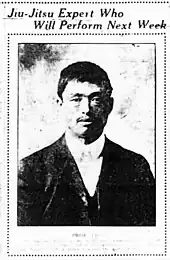Tokugoro Ito
Tokugoro Ito (1878-1939) was a Japanese judoka and professional wrestler.[1] Ito was one of the founding fathers of mixed martial arts in Brazil.[2]

Early years
Ito was an instructor of judo at Tokyo Imperial University in Japan.[3] In 1911, Akitaro Ono and Tokugoro Ito joined Mitsuyo Maeda and Soshihiro Satake in Cuba. The four men were known as the "Four Kings of Cuba".[4]
Wrestling
Ito's first wrestling match against someone was not Japanese occurred in 1909.[3] Ito defeated American Wrestler Eddie Robinson.[5] In 1914, Ito engaged in many matches. He initially lost but later defeated Ad Santel in a wrestling match.[6] The loss was a result of Ito being thrown on his head by Santel.[3] Ito at the time was a 5th degree black belt in judo.[7] He additionally defeated Joe Acton.
Later years
In his later years he founded the Rafu Judo Dojo in Los Angeles and previously was a leader of the Seattle Dojo from 1907 to 1911.[8] His notable students included Tsutao Higami.[9] Ito was also an instructor of Geo Omori and Sanpo Toku.
References
- Saalbach, Axel. "Wrestlingdata.com". wrestlingdata.com.
- Nash, John S. (November 3, 2012). "Chronicling the Origins of MMA". Cageside Seats.
- Nash, John S. (December 22, 2012). "The Forgotten Golden Age of MMA - Part IV". Cageside Seats.
- says, Rohit Vasudevan (14 December 2014). "The First Jiu Jitsu Competition in Brazil | BJJ Heroes".
- Gilboa, Ram (September 20, 2018). "Take the B out of BJJ: A Mata Leão by any other name will still choke you out". Bloody Elbow.
- Wilcox, Nate (February 6, 2008). "Really Old School: Catch Wrestling vs Judo 1921". Bloody Elbow.
- "Catch Wrestling - The Grappling Art That Started it All". December 10, 2019.
- "History of Nanka Judo | NankaJudo.com".
- Saalbach, Axel. "Wrestlingdata.com". wrestlingdata.com.